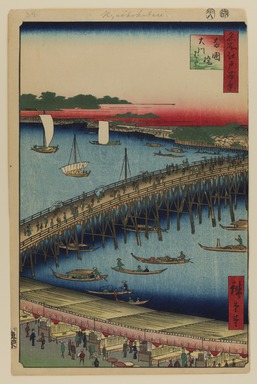
Artist:Utagawa Hiroshige
Medium: Woodblock print
Geograhical Locations:
Dates:8th month of 1856
Dimensions: Image: 13 1/2 x 8 3/4 in. (34.3 x 22.2 cm)
Collections:
Exhibitions:
Accession Number: 30.1478.59
Image: 30.1478.59_PS20.jpg,
Catalogue Description:
The Ryogoku Bridge was described by Hiroshige himself as "the liveliest place in the Eastern capital, with side-shows, theaters, story-tellers and summer fireworks; day and night, the amusements never cease" (Ehon Edo Miyage, vol. 1). In this Z-shaped composition, Hiroshige depicts the bridge more as a place of passage than as a place of pleasure. Ryogoku Bridge was first named "Ohashi" (Great Bridge) but in popular usage it was referred to as Ryogokubashi, or "Two-Province Bridge." The "Great Riverbank" of the title (Okawabata) referred to the east bank of the Sumida. The river scene shows a mixture of cargo and passenger boats and below the shore are riverside tea stalls. The black stakes in the water near the shore known as Hyappongui ("Hundred Stakes") were designated as a breakwater to protect the shore from the fast current as the river curved eastward.